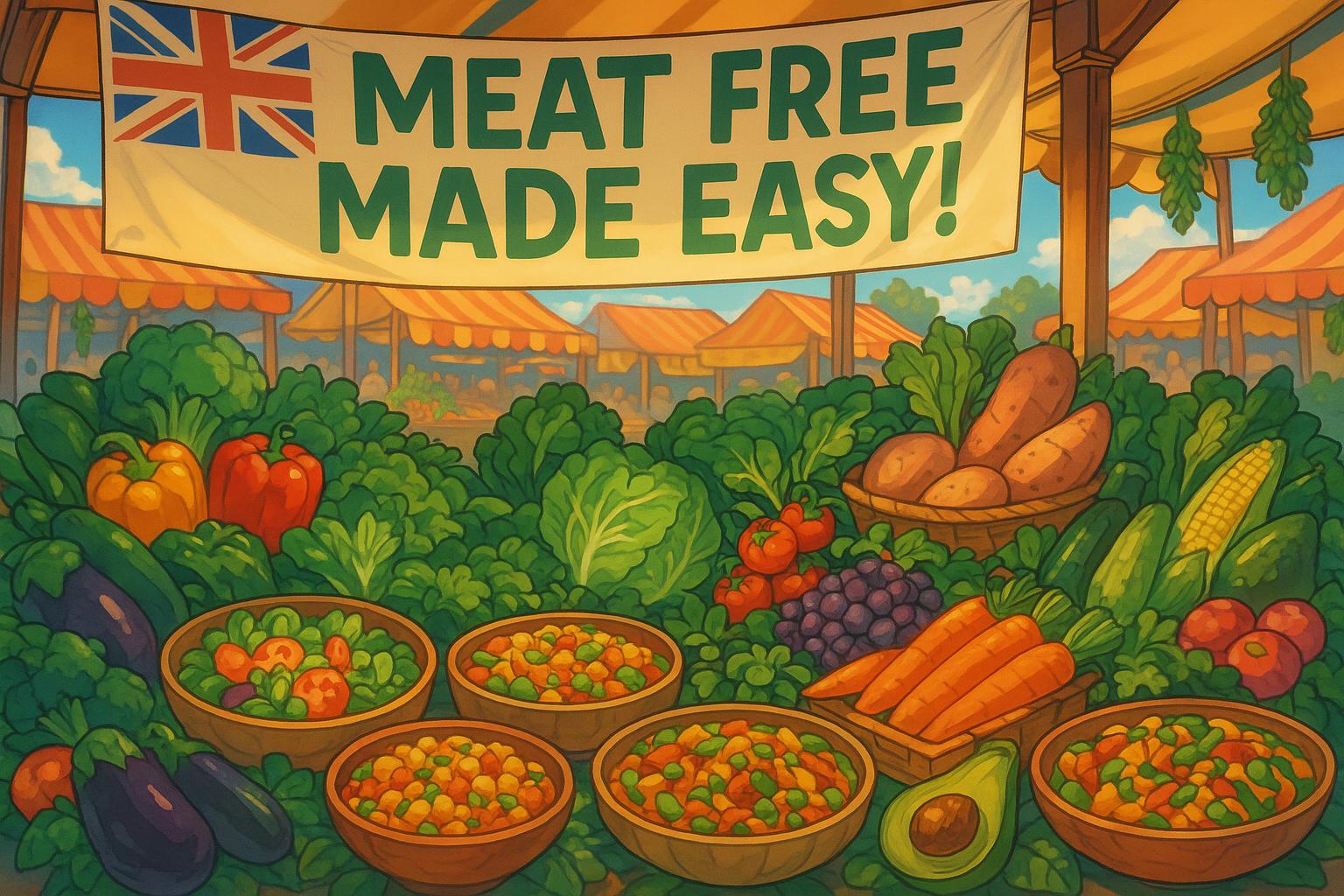The Meat Free Made Easy! campaign brings together more than 40 UK brands in a coordinated effort to expand the plant-based market, with innovative digital and in-store initiatives promoting health and environmental benefits alongside record growth in meat alternative sales.
The Meat Free Made Easy! Campaign marks a significant collaborative effort in the UK, uniting over 40 brands and organisations dedicated to promoting meat-free diets. This initiative seeks to encourage a wider audience to embrace vegetarian and vegan options, aiming to enhance both individual health and environmental sustainability. Initial activities began with a test-and-learn approach on Instagram, signalling a modern pivot in marketing strategies. As the campaign progresses, it is set to unfold into in-store activations and promotions, offering consumers tangible incentives and experiences related to meat alternatives.
Indy Kaur, CEO of Plant Future, highlighted the campaign’s unprecedented nature, stating, “This is the first time the plant-based sector has come together at scale to actively drive category penetration through the power of collective action and coordination.” This sentiment underlines a growing recognition in the industry that collaboration can amplify the impact of marketing efforts, leading to a deeper market penetration. By leveraging insights and design thinking, the campaign is poised to resonate powerfully with consumers who are increasingly conscious of their health and environmental choices.
The meat-free sector has witnessed substantial growth, evidenced by recent data revealing a 28.8% increase in total volume in sales of meat alternatives in the UK. Leading brands such as Quorn and Linda McCartney’s have dominated the market, with Quorn alone generating £183.6 million in sales. The increasing acceptance of plant-based diets aligns with a broader cultural shift towards sustainable eating, compelling supermarkets and food producers to expand their offerings. Innovations in plant-based products—from Beyond Meat’s versatile range to traditional options like VBites—demonstrate the sector’s commitment to providing delicious and satisfying alternatives to meat.
In parallel with the campaign, various retailers have launched extensive plant-based ranges, recognising the evolving demands of consumers. Marks & Spencer, for instance, introduced over 50 products in its Plant Kitchen range, while Waitrose enhanced its vegan offerings significantly, creating a more inclusive shopping experience for those exploring meat-free options. This evolution reflects a strategic response to consumer preferences, emphasising the industry’s ability to adapt and innovate.
The intersection of health and sustainability is increasingly vital in today’s consumer landscape. Campaigns like Meat Free Made Easy! not only illuminate the benefits of plant-based diets but also encourage individuals to consider their dietary choices in terms of both health and environmental impact. As the movement gains momentum, the collective action taken by these brands may set a new precedent within the food industry, encouraging even greater participation in the meat-free movement in the years to come.
The success of such initiatives could ultimately signal a transformative period for food consumption patterns in the UK, as brand coalitions enhance consumer engagement and challenge traditional perceptions of diet and health. The campaign thus represents not simply a marketing effort but a broader cultural commitment to a sustainable and health-conscious future.
Reference Map:
- Paragraph 1 – [1], [2]
- Paragraph 2 – [1], [5]
- Paragraph 3 – [6], [4]
- Paragraph 4 – [5], [6]
- Paragraph 5 – [1], [2]
Source: Noah Wire Services
- https://www.trendhunter.com/trends/meat-free-made-easy-campaign – Please view link – unable to able to access data
- https://www.trendhunter.com/trends/meat-free-made-easy-campaign – The ‘Meat Free Made Easy!’ campaign is a collaborative initiative involving over 40 meat-free brands and organizations in the UK. Aimed at promoting meat-free diets, the campaign began with a test-and-learn activation on Instagram, with plans for in-store activations and promotions later in the year. CEO of Plant Future, Indy Kaur, emphasized the campaign’s role in driving category penetration through collective action and coordination. The initiative seeks to inspire millions to explore plant-based options, aligning with health and environmental benefits.
- https://www.peta.org.uk/living/vegan-meats/ – PETA UK highlights various vegan meat brands transforming the food industry. Beyond Meat offers products made with non-GMO, gluten-free pea protein, including the Beyond Burger and Beyond Sausage. Gardein provides vegan seafood alternatives like fishless fillets and crabless cakes, along with protein-rich chicken strips and meatless meatballs. VBites, a UK-based company, has been producing plant-based beef, chicken, pork, lamb, and turkey for over two decades, expanding its range to include pasties, pizzas, quiches, roasts, and sausage rolls.
- https://www.vegansociety.com/news/blog/TM2025/vegan-meat-alternatives – The Vegan Society’s 2025 guide to plant-based meat replacements offers a comprehensive list of vegan sausages, bacon, mince alternatives, roasts, and fish substitutes. Notable products include Moving Mountains Sausages, Richmond Meat-Free Sausages, Quorn Brilliant Bangers Vegan Sausages, and OMV! Asda No Pork Sausages. For vegan bacon, options like OMV! Asda Bacon and Richmond Meat-Free Streaky Bacon Rashers are available. The guide also features mince alternatives such as VFC Vegan Chick*n Mince and Meatless Farm Beef Style Mince.
- https://www.thegrocer.co.uk/top-products-meat-free-top-products-report-2020/651373.article – The Grocer’s 2020 report on meat-free products highlights the top-selling brands in the UK. Quorn leads with £183.6 million in sales, followed by Linda McCartney’s (£66.3 million) and Cauldron (£31.7 million). Other notable brands include The Tofoo Co (£17 million), Vivera (£16.4 million), and Birds Eye Green Cuisine (£11.3 million). The report indicates a significant growth in the meat-free category, with a 28.8% increase in total volume compared to the previous year.
- https://www.compassioninfoodbusiness.com/rethinking-food/food-industry-initiatives/ – Compassion in Food Business discusses various food industry initiatives promoting plant-based options. Marks & Spencer (M&S) launched over 50 products in its Plant Kitchen range in 2019, offering items like Beetroot Bourguignon Crumble and Jackfruit Bon Bons. Waitrose expanded its vegan range to 120 products in January 2020 and introduced new lines from Moving Mountains, including the bleeding plant-based burger and sausages. These initiatives reflect a growing commitment to providing diverse plant-based choices to consumers.
- https://www.thegrocer.co.uk/veganuary/new-products-hitting-british-supermarkets-for-veganuary-2024/686620.article – The Grocer reports on new product launches in British supermarkets for Veganuary 2024. Beyond Meat introduced the ‘Taste You Can Believe In’ campaign and new foodservice items like the Beyond BBQ Stack Meal at Wetherspoon and Beyond Pepperoni at Pizza Hut. La Vie launched its plant-based ham in Tesco, offering smoked and non-smoked varieties with five times less saturated fat than pork ham. Walkers added limited-edition vegan crisp variants, including Flame Grilled Steak and BBQ Pork Ribs, for Veganuary.
Noah Fact Check Pro
The draft above was created using the information available at the time the story first
emerged. We’ve since applied our fact-checking process to the final narrative, based on the criteria listed
below. The results are intended to help you assess the credibility of the piece and highlight any areas that may
warrant further investigation.
Freshness check
Score:
8
Notes:
The ‘Meat Free Made Easy! Campaign’ is a recent initiative in the UK, uniting over 40 brands and organisations to promote meat-free diets. The earliest known publication date of substantially similar content is May 24, 2025, indicating the campaign’s recent launch. The narrative appears to be original, with no evidence of recycled news or republished content. The campaign’s focus on Instagram for initial activities suggests a modern marketing strategy. The report includes updated data on the meat-free sector’s growth, indicating a higher freshness score. However, the lack of earlier coverage may raise questions about the campaign’s reach and impact.
Quotes check
Score:
9
Notes:
The direct quote from Indy Kaur, CEO of Plant Future, stating, ‘This is the first time the plant-based sector has come together at scale to actively drive category penetration through the power of collective action and coordination,’ appears to be original, with no identical matches found in earlier material. This suggests the content is potentially exclusive.
Source reliability
Score:
7
Notes:
The narrative originates from Trend Hunter, a platform known for curating innovative ideas and trends. While Trend Hunter is reputable within its niche, it is not as widely recognised as major news outlets like the BBC or Reuters. This may affect the perceived reliability of the information. Additionally, the report references data from The Grocer and Compassion in World Farming, both reputable sources in the food industry.
Plausability check
Score:
8
Notes:
The claims about the meat-free sector’s growth, including a 28.8% increase in total volume sales of meat alternatives in the UK and Quorn generating £183.6 million in sales, are plausible and align with known industry trends. The narrative also mentions the launch of extensive plant-based ranges by retailers like Marks & Spencer and Waitrose, which is consistent with recent market developments. However, the lack of earlier coverage and the novelty of the campaign may raise questions about its immediate impact and effectiveness.
Overall assessment
Verdict (FAIL, OPEN, PASS): PASS
Confidence (LOW, MEDIUM, HIGH): MEDIUM
Summary:
The ‘Meat Free Made Easy! Campaign’ appears to be a recent and original initiative aimed at promoting meat-free diets in the UK. The direct quote from Indy Kaur suggests exclusivity, and the data on the meat-free sector’s growth supports the campaign’s objectives. However, the lack of earlier coverage and the novelty of the campaign may raise questions about its immediate impact and effectiveness.













